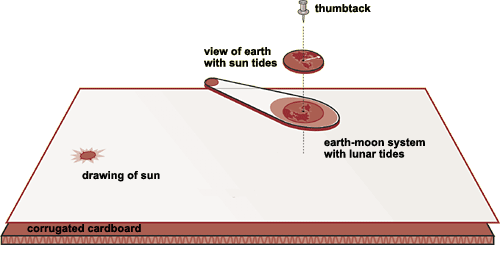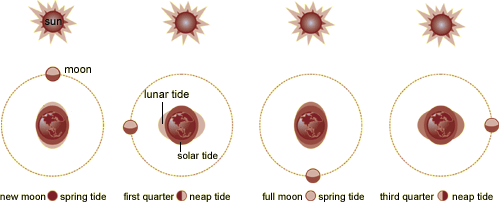Try
This!
The sun creates tides, too
You will need to
print this
page
.
If the link above doesn't work, try typing Ctrl + P on a PC or Apple
+ P on a Macintosh
.
The sun also pulls up tides on the earth. The solar tides are toward the
sun and away from the sun. The total tide is the sum of the solar and
lunar tides and depends on the alignment of the sun and the moon. Since
each phase of the moon also depends on the alignment of the sun and the
moon, the pattern of tides follows the moon’s phases.
Materials
• Model from "The tides get later" activity
• Earth with sun tides image
Assembly
• Print this page and cut out the drawing of the earth with sun tides
(below).

• Remove the earth from the north pole image from your model and
replace it with this one.
• Draw a sun on your piece of cardboard.
To Do and Notice
• Assemble your tide activity
as shown below.

• Align the tides pulled up by the sun and the tides pulled up by
the moon, and compare them. Notice that the sun tides are only half as
high as the moon tides.
• Place the moon directly between the earth and the sun. Now it's
a new moon. The high lunar and solar tides combine, causing a lunar-solar
high tide known as a spring tide (spring as in "to leap up,"
not as in the season).
• Revolve the moon in its orbit counterclockwise 90 degrees without
letting the sun tides revolve. (Viewing the page as a clock, if the sun
is at 9 o'clock, the moon will be at 6 o'clock.) This is the first-quarter
position. With the high tides produced by the sun and the moon at 90-degree
angles, the solar high tide partly fills in the lunar low tide. These
tides, which have the lowest change in height between high and low tides,
are called neap tides.
• Move the moon opposite the sun with the earth between them, which
is the full-moon position. Notice the addition of the tides when the moon
is full.
• Finally, move the moon to the third-quarter position and notice
that the tides fill in once more. You total tide cycle should look like
this:

What's Going On?
The force of the sun on you as you stand on the surface of the earth is 180 times greater than the force of the moon on you. But what raises tides is the difference in the gravitational force from one side of the earth to the other. Although the force from the sun is greater, the sun is also much more distant. The difference in the force of the sun across the earth is only 0.0017 percent, while the moon's pull across the earth differs by 6.7 percent.